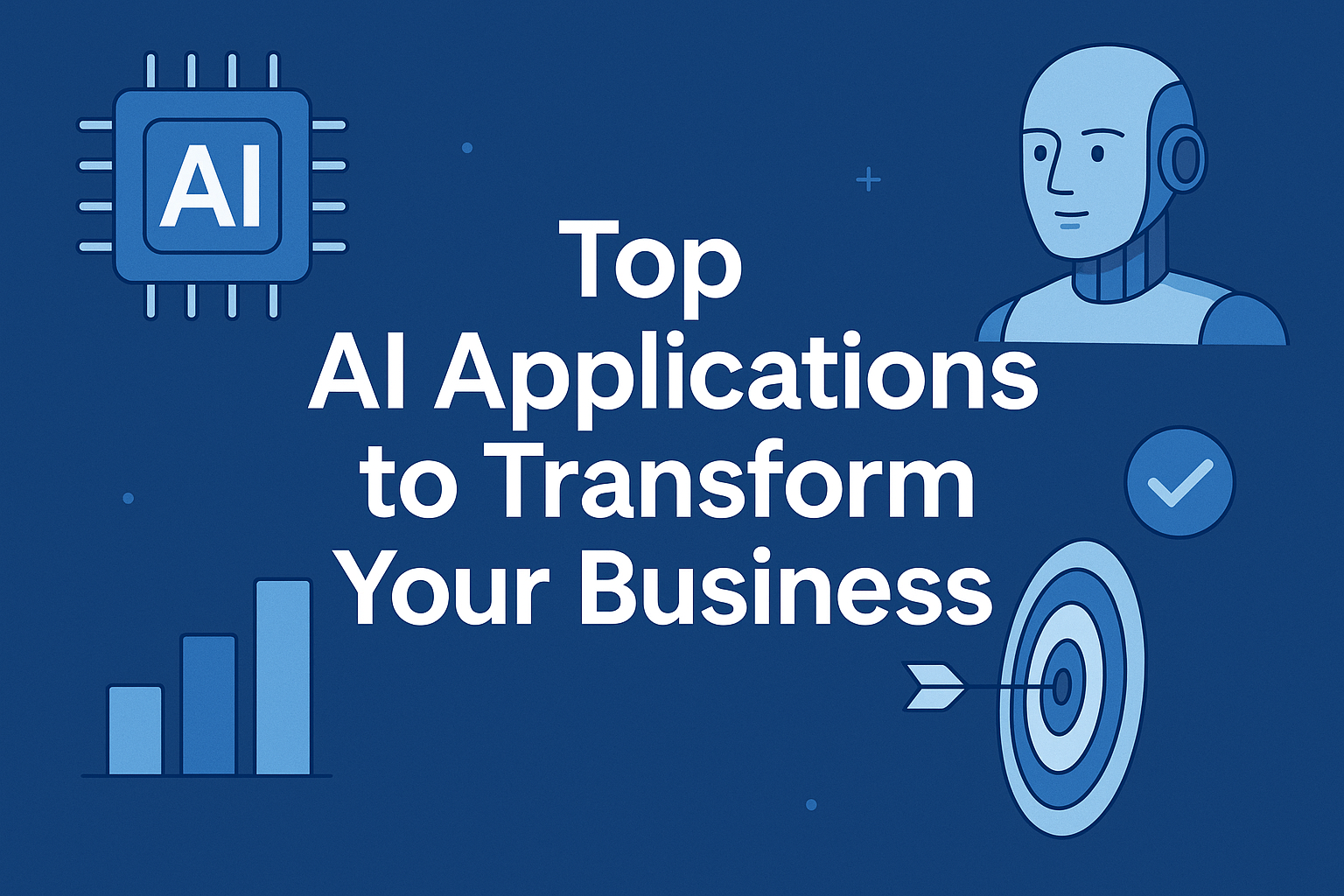In today’s rapidly evolving digital landscape, artificial intelligence is not just a futuristic concept but a vital tool for modern businesses seeking to enhance their operations and outpace competitors.
From automating mundane tasks to providing insightful data analysis, AI applications are transforming the way companies operate, offering unprecedented opportunities for growth and efficiency.
As business professionals, entrepreneurs, and students eager to harness the power of AI in business, it is crucial to understand the practical applications and benefits that these technologies bring.
In this post, we will delve into compelling business examples of AI, showcasing how machine learning and automation are revolutionizing industries and driving business efficiency to new heights.
Prepare to explore how artificial intelligence is redefining possibilities and learn how to integrate these innovations into your strategic business plans.
Revolutionizing Customer Service
Artificial intelligence is transforming customer service, enabling businesses to provide faster, more personalized, and efficient support. This section explores how AI applications are reshaping customer interactions and improving overall satisfaction.
AI Chatbots in Business
AI-powered chatbots have become indispensable tools for businesses seeking to enhance customer service. These intelligent virtual assistants can handle a wide range of customer inquiries, providing instant responses 24/7.
By leveraging natural language processing and machine learning algorithms, chatbots can understand and interpret customer queries, offering accurate and relevant information. This technology significantly reduces response times and improves overall customer satisfaction.
Moreover, AI chatbots can learn from each interaction, continuously improving their ability to assist customers effectively. As they gather data on common issues and customer preferences, businesses can gain valuable insights to further refine their products and services.
Personalized Customer Experiences
AI applications are revolutionizing the way businesses deliver personalized experiences to their customers. By analyzing vast amounts of customer data, AI algorithms can identify individual preferences, behaviors, and needs.
This deep understanding allows companies to tailor their products, services, and communications to each customer’s unique profile. For example, e-commerce platforms can use AI to recommend products based on a customer’s browsing history and purchase patterns.
Furthermore, AI-driven personalization extends to customer support, where systems can route inquiries to the most suitable agent based on the customer’s history and the nature of their query. This level of customization not only enhances customer satisfaction but also increases loyalty and retention rates.

Automation of Support Tasks
AI is streamlining customer support operations by automating repetitive and time-consuming tasks. This automation allows human agents to focus on more complex issues that require empathy and critical thinking.
Some key areas where AI is automating support tasks include:
-
Ticket categorization and routing: AI systems can analyze incoming support tickets and automatically assign them to the appropriate department or agent.
-
Knowledge base management: AI can continuously update and organize support documentation, making it easier for both customers and agents to find relevant information.
-
Sentiment analysis: AI tools can assess customer emotions in real-time, allowing agents to prioritize urgent or sensitive cases.
By implementing these AI-driven automations, businesses can significantly reduce response times, improve first-contact resolution rates, and enhance overall customer satisfaction.
Enhancing Marketing Strategies
Artificial intelligence is revolutionizing marketing strategies, enabling businesses to target audiences more effectively, create compelling content, and optimize campaigns in real-time. This section explores the transformative impact of AI on modern marketing practices.
Predictive Analytics in Marketing
Predictive analytics powered by AI is reshaping how businesses approach marketing strategies. By analyzing historical data and identifying patterns, AI algorithms can forecast future trends and customer behaviors with remarkable accuracy.
This technology enables marketers to:
-
Anticipate customer needs and preferences
-
Optimize pricing strategies
-
Identify potential churn risks
-
Predict the success of marketing campaigns
For example, a retail company might use predictive analytics to forecast which products will be in high demand during specific seasons, allowing them to adjust inventory and marketing efforts accordingly.
By leveraging these insights, businesses can make data-driven decisions that maximize ROI and improve overall marketing effectiveness.
AI-Driven Content Creation
AI is transforming content creation by assisting marketers in producing high-quality, engaging content at scale. Natural language processing and machine learning algorithms can analyze vast amounts of data to generate written content, design visuals, and even create video scripts.
Some applications of AI in content creation include:
-
Automated blog post generation: AI tools can create draft articles on specific topics, which human writers can then refine and personalize.
-
Personalized email campaigns: AI can tailor email content to individual recipients based on their preferences and behaviors.
-
Social media post optimization: AI algorithms can suggest the best times to post and recommend content types that are likely to engage specific audience segments.
While AI-driven content creation is not meant to replace human creativity, it serves as a powerful tool to augment and streamline the content production process.
Targeted Advertising with AI
AI is revolutionizing targeted advertising by enabling businesses to deliver highly personalized ads to the right audience at the right time. Machine learning algorithms analyze user data, including browsing history, purchase behavior, and demographic information, to create detailed customer profiles.
This level of targeting allows marketers to:
-
Improve ad relevance: AI can match ads to users most likely to be interested in the product or service.
-
Optimize ad placement: AI algorithms can determine the best platforms and times to display ads for maximum impact.
-
Enhance bidding strategies: In programmatic advertising, AI can adjust bids in real-time based on the likelihood of conversion.
By leveraging AI in targeted advertising, businesses can significantly improve their return on ad spend and create more meaningful connections with their audience.
Streamlining Operations
Artificial intelligence is transforming business operations, enhancing efficiency, and reducing costs across various industries. This section explores how AI applications are optimizing supply chains, maintenance processes, and overall business operations.
Automation in Supply Chain Management
AI is revolutionizing supply chain management by automating complex processes and providing real-time insights. Machine learning algorithms can analyze vast amounts of data to optimize inventory levels, predict demand, and streamline logistics.
Key applications of AI in supply chain management include:
-
Demand forecasting: AI models can predict future demand with high accuracy, helping businesses optimize inventory levels and reduce waste.
-
Route optimization: AI algorithms can determine the most efficient delivery routes, considering factors such as traffic, weather, and delivery priorities.
-
Warehouse automation: AI-powered robots and systems can automate picking, packing, and sorting processes, increasing efficiency and reducing errors.
By implementing these AI-driven solutions, businesses can significantly reduce operational costs, improve delivery times, and enhance overall supply chain resilience.
AI for Predictive Maintenance
Predictive maintenance powered by AI is transforming how businesses approach equipment upkeep and repair. By analyzing data from sensors and historical maintenance records, AI algorithms can predict when machinery is likely to fail or require servicing.
Benefits of AI-driven predictive maintenance include:
-
Reduced downtime: By addressing potential issues before they cause breakdowns, businesses can minimize unplanned downtime.
-
Cost savings: Predictive maintenance allows companies to perform maintenance only when necessary, reducing overall maintenance costs.
-
Extended equipment lifespan: By addressing issues early, businesses can prolong the life of their machinery and equipment.
Industries such as manufacturing, energy, and transportation are already reaping the benefits of AI-powered predictive maintenance, seeing significant improvements in operational efficiency and cost reduction.
Business Process Optimization
AI is playing a crucial role in optimizing business processes across various departments and industries. By analyzing workflows, identifying bottlenecks, and suggesting improvements, AI can help businesses streamline their operations and boost productivity.
Some key areas where AI is optimizing business processes include:
-
Workflow automation: AI can automate repetitive tasks, freeing up employees to focus on higher-value activities.
-
Resource allocation: AI algorithms can optimize the allocation of human and material resources based on current needs and future projections.
-
Quality control: AI-powered computer vision systems can detect defects and inconsistencies in manufacturing processes with high accuracy.
By leveraging AI for business process optimization, companies can achieve significant improvements in efficiency, quality, and overall operational performance.
Improving Data-Driven Decisions
Artificial intelligence is revolutionizing the way businesses analyze data and make strategic decisions. This section explores how AI applications are enhancing data analysis, business intelligence, and real-time decision-making processes.
Machine Learning in Data Analysis
Machine learning algorithms are transforming data analysis by uncovering complex patterns and insights that might be missed by traditional analytical methods. These AI-powered tools can process vast amounts of structured and unstructured data, providing businesses with valuable insights for decision-making.
Key applications of machine learning in data analysis include:
-
Anomaly detection: ML algorithms can identify unusual patterns or outliers in data, helping businesses detect fraud or system failures.
-
Predictive modeling: ML models can forecast future trends and outcomes based on historical data and current conditions.
-
Natural language processing: ML-powered NLP tools can analyze text data from customer feedback, social media, and other sources to extract meaningful insights.
By leveraging machine learning in data analysis, businesses can make more informed decisions, identify new opportunities, and mitigate risks more effectively.
AI Tools for Business Intelligence
AI is enhancing business intelligence (BI) by providing more sophisticated analysis and visualization capabilities. These tools can process large volumes of data from various sources, presenting insights in an easily digestible format for decision-makers.
Some key features of AI-powered BI tools include:
-
Automated reporting: AI can generate comprehensive reports and dashboards, saving time and ensuring consistency.
-
Natural language queries: Users can ask questions in plain language and receive relevant data and visualizations.
-
Predictive analytics: AI-driven BI tools can forecast future trends and outcomes based on historical data and current market conditions.
By adopting AI-powered BI tools, businesses can make data-driven decisions more quickly and confidently, leading to improved performance and competitive advantage.
Real-Time Data Processing
AI is enabling businesses to process and analyze data in real-time, allowing for immediate insights and faster decision-making. This capability is particularly valuable in fast-paced industries where conditions can change rapidly.
Benefits of AI-powered real-time data processing include:
-
Immediate response to market changes: Businesses can quickly adjust strategies based on real-time market data.
-
Enhanced customer experiences: Real-time data processing allows companies to personalize interactions and offers on the fly.
-
Improved operational efficiency: Real-time monitoring and analysis can help businesses identify and address issues as they occur.
By leveraging AI for real-time data processing, businesses can stay agile and responsive in today’s fast-paced business environment.
Transforming Financial Services
Artificial intelligence is revolutionizing the financial services industry, enhancing security, streamlining processes, and improving customer experiences. This section explores how AI applications are reshaping various aspects of financial services.
Fraud Detection with AI
AI-powered fraud detection systems are transforming how financial institutions protect themselves and their customers from fraudulent activities. These systems can analyze vast amounts of transaction data in real-time, identifying suspicious patterns and anomalies that might indicate fraud.
Key benefits of AI in fraud detection include:
-
Improved accuracy: AI algorithms can detect subtle patterns that might be missed by traditional rule-based systems.
-
Real-time monitoring: AI can analyze transactions as they occur, allowing for immediate intervention when suspicious activity is detected.
-
Adaptive learning: AI systems can continuously learn from new data, improving their ability to detect evolving fraud tactics.
By implementing AI-driven fraud detection, financial institutions can significantly reduce losses due to fraud while minimizing false positives that might inconvenience legitimate customers.
Automated Financial Reporting
AI is streamlining financial reporting processes, reducing the time and effort required to generate accurate and compliant reports. Machine learning algorithms can analyze financial data, extract relevant information, and generate reports in accordance with regulatory requirements.
Benefits of automated financial reporting include:
-
Increased accuracy: AI can reduce human errors in data entry and calculations.
-
Time savings: Automated reporting frees up finance professionals to focus on higher-value tasks.
-
Improved compliance: AI systems can ensure reports adhere to the latest regulatory standards.
By leveraging AI for financial reporting, businesses can improve the efficiency and accuracy of their financial processes while reducing compliance risks.
Personalized Banking Experiences
AI is enabling banks to offer highly personalized services to their customers, tailoring products and recommendations based on individual financial behaviors and needs. Machine learning algorithms can analyze customer data to provide personalized advice, product recommendations, and financial planning assistance.
Key applications of AI in personalized banking include:
-
Customized financial advice: AI-powered chatbots and virtual assistants can provide personalized financial guidance based on a customer’s financial history and goals.
-
Tailored product recommendations: AI can suggest financial products that best suit a customer’s needs and risk profile.
-
Proactive financial management: AI systems can alert customers to potential issues, such as upcoming bill payments or unusual spending patterns.
By leveraging AI to deliver personalized banking experiences, financial institutions can improve customer satisfaction, increase loyalty, and drive growth through more targeted product offerings.




